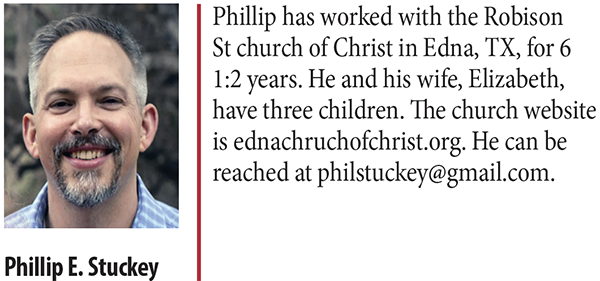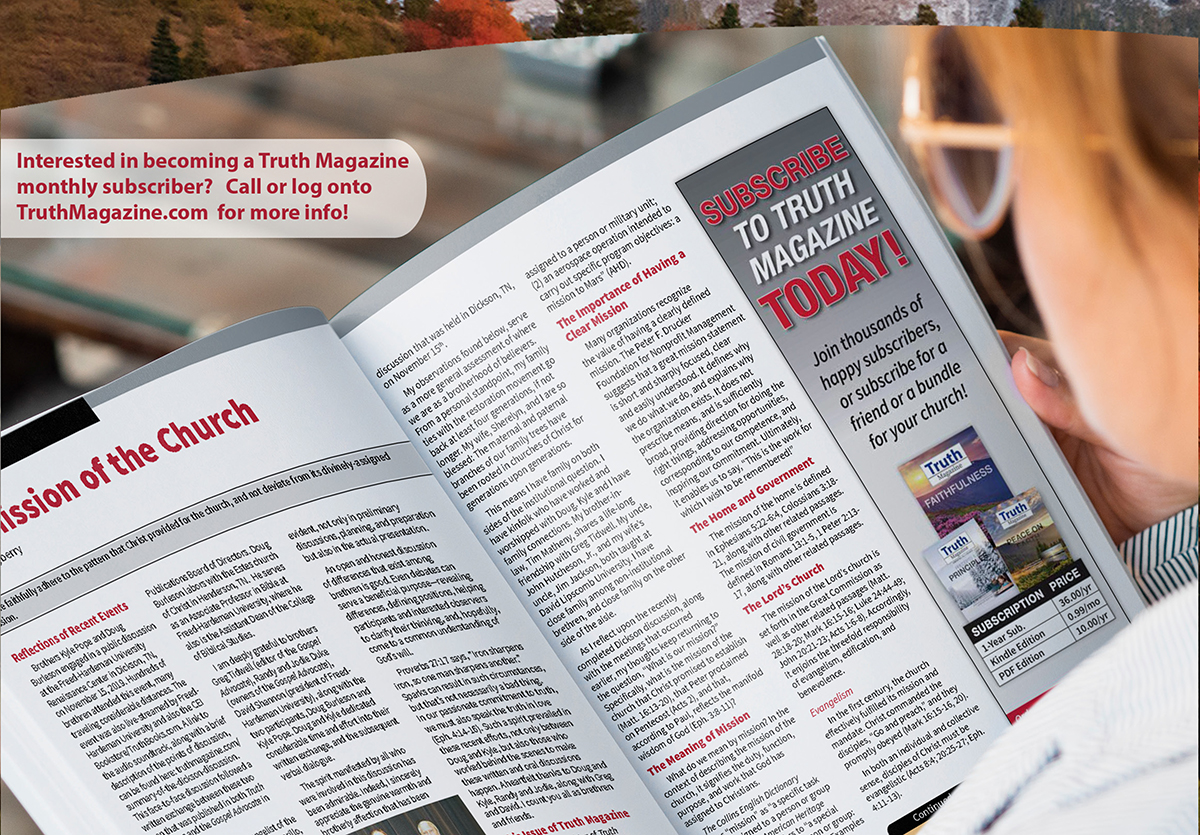by Phillip Stuckey
Synopsis: This special edition of Truth Magazine examines various areas of the work of elders and offers practical guidance on how they care for members of the local church. Thanks to Phillip Stuckey for selecting this theme and these writers.
The apostle Paul called the work of shepherding a “noble task:”
The saying is trustworthy: If anyone aspires to the office of overseer, he desires a noble task (1 Tim. 3:1, ESV).
One of the most encouraging and comforting truths revealed in Scripture is that Almighty God desires all people to be saved (1 Tim. 2:4). He accomplished this grand purpose through the death, burial and resurrection of our Lord Jesus Christ (John 3:16; Col. 1:20). Those who respond to the gospel call are adopted into the family of God and become a part of the body of Christ, which is His church (Acts 2:47; 5:14; 11:42; Eph. 5:23; Col. 1:24).
The church of our Lord was not a mere afterthought but part of God’s eternal purpose in Christ Jesus (Eph. 3:9-11). Within the church, God has planned for the care and growth of His people and the furtherance of His work in this world. As the apostles revealed, God planned and purposed different roles within the body of Christ to help the saints grow in grace, faith and knowledge so that they would be equipped to do His will. Among those various functions, we find shepherds—or pastors—who are also called overseers and elders in other passages (Eph. 4:11-16; 1 Pet. 5:1-4; Titus 1:5-9; Acts 20:17, 28).
Finding this work spoken of in connection with the growth of the church and equipping of the saints should impress us with its need and importance. If it is part of God’s design and plan for the church, then we know it is vital to our spiritual wellbeing as Christians. Not only that, but we find that this work was not to be done by just anyone. Only those who had demonstrated a certain level of growth and experience in the faith were to take on this work in the local church (1 Tim. 3:1-7; Titus 1:5-9).
There has always been an abundant need to study and focus on these qualifications. After all, no one should desire to appoint men who aren’t qualified to engage in this work. Yet, what do these men actually do in a local church?
As we look at each of the terms that refer to this work, we gain insight into the work of shepherds.
As one examines the New Testament, it becomes clear that God’s pattern is for each local church to be comprised of saints, deacons, and those who serve as overseers (Phil. 1:1). Paul speaks of the work of the overseer in his letter to Timothy, calling it a “noble task” (1 Tim. 3:1). The term, overseer, helps us understand one facet of this work. An overseer is one who is in charge; in the New Testament it is someone who was a leader in the local church (Kashow).
It is not surprising, therefore, that as the gospel spreads, we see congregations that grow so that each has a plurality of men serving as elders (Acts 14:23; Titus 1:5). Once again, we discern another clue about the work of these men. In the Bible, an elder was an older person or a person with authority; in the New Testament, an elder held an office of leadership in the synagogue and the local church (Victor).
Because of the nature of their work, these overseers/elders were also identified as shepherds or pastors. Like a shepherd with his sheep, these men were responsible for watching over, protecting, and providing for the spiritual welfare of the members of the church they served (Act 20:17, 28; 1 Pet. 5:1-4).
Each of these terms offers rich and rewarding studies in the Hebrew and Greek Old Testament texts, helping us gain even more insight into their work. For example, contrast David’s description of God’s shepherding (Ps. 23) with Ezekiel and Jeremiah’s condemnation of those who had failed to shepherd God’s people (Ezek. 34:1-24; Jer. 2:8; 3:15). From this quick survey, we learn that shepherds were men who were tasked with exercising authority in leading and caring for the people of God in the church where they were appointed to serve (Acts 20:28; 1 Pet. 5:1-2).
Nevertheless, what does that look like on a practical level? Since each congregation is to be cared for by a plurality of shepherds [i.e., not just one man serving in the role] (Acts 14:23), what are some actual steps that can be taken that will strengthen their relationships with one another? How should they deal with conflict/consensus within the eldership? How do they encourage and admonish one another? How do they interact with the deacons in some of these same areas?
What about the saints (1 Pet. 5:2)? What are some practical strategies to get to know each member of the flock? How do they recognize the strengths of various members and put them to use in serving the body? How do they plan the content and curriculum to build up the body they serve?
What should be the relationship between the shepherds and the local evangelist (2 Tim. 4:5)? What are some “best practices” for engaging an evangelist or ending his work with a church? How do they mentor and foster growth in him? How do they work together to ensure that he is feeding the flock in ways they consider most useful??
What about brethren who are weak and struggling, whether spiritually or physically (1 Thess. 5:14)? How should they be approached? Are there limits to long-suffering in situations when the erring brother or sister is unwilling to change? Are there occasions when the shepherds should seek outside help from medical or psychological professionals?
What about those brethren who have gone astray (2 Thess. 3:6, 14-15; 1 Cor. 5:11-13)? How should shepherds guide the church in admonishing or, if need be, putting the erring out of the local church? What are some effective ways to encourage the wayward to repent and return?
These are just a few of the many duties that are involved in the work of shepherding. In this special edition, we have reached out to brothers who are currently serving as shepherds or have done so in the past. We have asked each of them to examine one specific area of the work of shepherds and offer some practical guidance on how elders care for different members of the church.
We commit these articles to you and commend those who invested their time and effort to contribute to this special issue. We pray these articles will be helpful to those who aspire to shepherd a flock one day or those who are already shepherding a local congregation.
May God bless us as we diligently seek to learn more about His will and about how to live as shining lights in the midst of a crooked and perverse generation (Phil. 2:15-16). May God bless us with brethren who will not only aspire to this work but who will carry out this noble task in the love and spirit of Jesus, the Chief Shepherd (1 Pet. 5:1-4; 1 Tim. 3:1).
Kashow, Robert C. “Overseer.” Edited by John D. Barry, David Bomar, Derek R. Brown, Rachel Klippenstein, Douglas Mangum, Carrie Sinclair Wolcott, Lazarus Wentz, Elliot Ritzema, and Wendy Widder. The Lexham Bible Dictionary. Bellingham, WA: Lexham Press, 2016.
Victor, William M. “Elder.” Edited by John D. Barry, David Bomar, Derek R. Brown, Rachel Klippenstein, Douglas Mangum, Carrie Sinclair Wolcott, Lazarus Wentz, Elliot Ritzema, and Wendy Widder. The Lexham Bible Dictionary. Bellingham, WA: Lexham Press, 2016.



